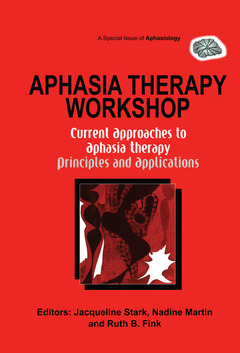Aphasia Therapy Workshop: Current Approaches to Aphasia Therapy - Principles and Applications A Special Issue of Aphasiology Special Issues of Aphasiology Series
Coordonnateurs : Stark Jacqueline Ann, Fink Ruth, Martin Nadine

The Aphasia Therapy Workshop brings together leading experts in the field of aphasia to address current approaches to aphasia rehabilitation. The topics in this special issue include:
1) Functional communication: Social models and psychosocial approaches
2) Technological advances : Computer - based approaches
3) Aphasia therapy duration: best when intensive and prolonged?
4) Cognitive neuropsychological approaches
5) (Psycho-) Linguistic approaches
6) Beyond language ? cognitive aspects of language therapy
The papers reflect the variety of approaches to treatment of aphasia and provide the reader with an update on the most current advances in our theories and practice of aphasia rehabilitation.
J. Stark, N. Martin, R. Fink, Current Approaches to Aphasia Therapy: Principles and Applications. S. Byng, J.F. Duchan, Social Model Philosophies and Principles: Their Applications to Therapies for Aphasia. L. Worrall, T. Rose, T. Howe, A. Brennan, J. Egan, D. Oxenham, K. McKenna, Access to Written Information for People with Aphasia. M.C. Linebarger, M.F. Schwartz, AAC for Hypothesis Testing and Treatment of Aphasic Language Production: Lessons from a 'Processing Prosthesis'. R. Fink, A. Brecher, P. Sobel, M.F. Schwartz, Computer-assisted Treatment of Word Retrieval Deficits in Aphasia. G.A. Stefanatos, A. Gershkoff, S. Madigan, Computer-mediated Tools for the Investigation and Rehabilitation of Auditory and Phonological Processing in Aphasia. J.J. Hinckley, T.H. Carr, Comparing the Outcomes of Intensive and Non-intensive Context-based Aphasia Treatment. A. Basso, How Intensive-prolonged should an Intensive-prolonged Treatment be? A.E. Hillis, J. Heidler, Contributions and Limitations of "The Cognitive Neuropsychological Approach" to Treatment: Illustrations from Studies of Reading and Spelling Therapy. B. Rapp, The Relationship between Treatment Outcomes and the Underlying Cognitive Deficit: Evidence from the Remediation of Acquired Dysgraphia. J. Marshall, D. Cairns, Therapy for Sentence Processing Problems in Aphasia: Working on Thinking for Speaking. C.K. Thompson, L.P. Shapiro, Treating Agrammatic Aphasia within a Linguistic Framework: Treatment of Underlying Forms. N. Friedmann, Degrees of Severity and Recovery in Agrammatism: Climbing up the Syntactic Tree. M. Nicholas, M.P. Sinotte, N. H-Estabrooks, Using a Computer to Communicate: Effect of Executive Function Impairments in People with Severe Aphasia. G. Ramsburger, Achieving Conversational Success in Aphasia by Focusing on Nonlinguistic Cognitive Skills; a Potentially Promising New Approach. J.A. Stark, Analysing the Language Therapy Process - The Implicit Role of Learning and Memory.
Date de parution : 06-2015
18.9x24.6 cm
Date de parution : 12-2005
Ouvrage de 196 p.
16.7x24.6 cm



